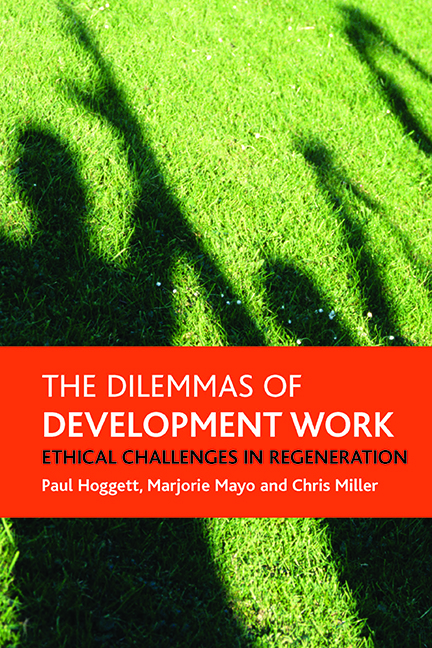six - Negotiating dilemmatic space
Published online by Cambridge University Press: 21 January 2022
Summary
Contested space
We made a distinction in previous chapters between those challenges that are inherent to the role of development workers, operating as they do on the boundary of state and civil society, and those which have arisen more specifically in the context of Labour's modernisation agenda. As we shall see in more detail in Chapter Eight, the modernisation agenda (Newman, 2001) has created its own dilemmas for such workers. The emphasis on short-term outputs and ‘measurables’, the heightened competition for time-limited funding streams (referred to as ‘troughing’ in some parts of the voluntary sector), the bureaucratic demands of project management work and the positivist and rationalistic ethos that now underlies much evidence-based practice and competence-based models of professional development leads to a managerialisation of welfare practice (Halford and Leonard, 1999, 2005) from which development workers are not immune. There is a real tension, revealed by our research, between these initiatives and the values of the development profession with its emphasis on long-term and sustainable change, outcomes rather than outputs, relationships and processes as well as activities.
In the previous two chapters we began to hypothesise a set of factors – human capacities, values, identities, social networks, institutional environments, discursive practices – which provide the conditions for ethical agency in this contested space. Each factor is potentially both a resource and a constraint. For example, the personal identity of a worker formed out of unique biographical circumstances and from the formations of class, ‘race’ and gender provides resources to be drawn on but also limits that person's sense of what is possible or desirable (Hoggett, Beedell, Jimenez, Mayo and Miller, 2006). Professionals bring something to their role in terms of values, identities and emotional capacities that pre-exist their engagement in that role. In this sense, the subject always partly precedes discourse and, far from being the simple bearer of a discourse such as modernisation, also has the capacity to resist it (Halford and Leonard, 2005).
Values are important in a second way. It became clear to us that many in our sample used their values as a kind of compass in dilemmatic space. We now realise that we are in the territory of Charles Taylor's (1989) work, as Taylor argues that values provide us with what he calls ‘orientation’ in moral space.
- Type
- Chapter
- Information
- The Dilemmas of Development WorkEthical Challenges in Regeneration, pp. 97 - 108Publisher: Bristol University PressPrint publication year: 2008

